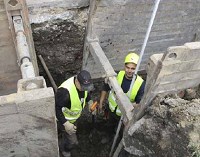Postcard from the pithole
Racially segregated world of labor in a certain town
Certain professions, such as diggers or street sweepers, are occupied by Roma. What is their experience with class, as seen through race?

Toward the end of May I regularly stood by a city’s construction site and observed five workers who were in constant motion, tirelessly working. They all were Roma and worked for a company owned by an entrepreneur who they said worked his way from nothing to become a millionaire.
One of the workers was a brother of my colleague who at that time worked with me on sweeping streets in the afternoons. Several times a day we stood by the wired fence over the pit and exchanged assorted stories with the workers while watching their fast pace. There are tens of similar construction sites in the city and the workers are mostly Roma. The shifts last nine to ten hours and the digging usually goes for six days a week. The negative side of the relatively high hourly wages is that there’s no income in the periods of no work. In addition, there’s usually no income at all for the two to three months in the winter time when it is impossible to dig, and not every entrepreneur secures alternate work for the diggers. In most cases, this is a contractual labor; meaning that the work does not count toward social security and retirement.
Colors of difficult labor
On a random visit to a city, one cannot miss the distinct, high-visibility vests of the street cleaners and construction site workers. Also impossible is to miss that the majority of these workers are Roma. It is therefore a bit puzzling to hear professionals from job placement agencies in that this is „yet another generation of Roma that has never worked and probably never will.“ An implicit presumption of statements such as these is that the said non-workers live comfortably on welfare. By field research to date shows a lot more varied picture. Roma do work in cities, but the types of jobs do not often come with a permanent contract, and often there is no contract at all. They work in types of jobs that non Roma workers would not want to take as it is too dirty; too hard; or too dangerous.
To find a different job than sweeping streets; separating trash; cleaning; digging; or assembling electronics in local industrial zones is considered practically impossible among the Roma I studied in the specific part of the city. The men who tried to find a job with small or mid-level entrepreneurs share the experience: „When they see you, they tell you they will call and then they never do.“ In more extreme cases they say, either in person or on the phone, that they do not, unfortunately, accept Roma. The situation is even more complicated for women who besides the tolerated racial discrimination also face the expectations and duties connected to their roles as mothers. Some Roma only posses elementary school education, though this is not a rule and there are those among the diggers and sweepers who have a trade school certificate. But inadequate education is seldom listed, and even job placement specialists do not place education at the top.
Inside and out
When discussing with former colleagues, it’s turned out that in the last five years they all worked either as diggers or assembly-line workers for „Korean companies“ and now they are sweepers. The two most frequently cited reasons for leaving the assembly lines in the industrial zones that the city launched in response to high unemployment ten years ago are non-renewal work contracts and unbearably strenuous work. The management’s frequent response to any workers concerns is high demand for their position; i.e. easy replaceability of such workers. For example, one of the construction site workers spent two years working for an automobile company. „When it was necessary, for example when they had a large order, they employed people on a temporary basis, for instance for six months. Then they let them go and the people went back to collecting unemployment. Another one spent eight years working for a company that assembles electronics. Gradually, he moved to the position of team leader: „Typically we knew
three weeks ahead of time that they will accept more people. They were employed through an agency, usually on a three-month contract. The people would be periodically returning, so there was no longer need for a job training.“
To be pulled into and then let go again depending on the capital’s needs does not concern all employees. Even among the diggers there are those who have permanent contracts. The system that is in place in the city has created a hierarchy among the workers. Although the low qualified workers do have a chance to become permanent, the majority of people for various reasons never secure such opportunity. Many have needed to learn to live with the uncertainty of being unemployed again.
Dirty work and woman’s work
The majority of my colleagues from the sweeping department in a company that manages the city’s sanitation were Roma. While sweeping streets one spring morning, a car belonging to a company that manages trash in the city passed us by. They emptied trashcans but left garbage left next to the trashcans. „Why don‘t they take all the garbage?“ I asked a colleague. „They don’t feel like it; the Gypsies will pick it up, after all“ my colleague chuckled phlegmatically and began throwing the garbage remains into empty containers.
One of the first questions I was asked when starting the job was whether I would not be ashamed to roam the city with a broom and a cart. Although those who have worked for the company for years have a developed relationship to the areas they work in, they know the shop assistants; people who live in the neighborhood, and various city figures. Even so, it is clear that the job is not without a certain stigma. That, however magically disappears once the „dirty“ labor moves from the public space to a closed hangar on the city’s periphery. At the trash-separating operation nobody talked of shame, rather about unbearable stench, though this is apparently something one can get used to. The women – the vast majority of them Roma – separated various types of plastic from the mixed garbage. Men worked as workers throwing garbage or operated various small vehicles or the recycling press. When we once asked one of the men to help is, he noted jokingly „What? Am I a woman?“ His twenty-year old colleague couldn’t
wait to be released from throwing garbage to go back to the line. He said that throwing garbage onto an upward-moving line is too physically demanding for him.
The picture that the city offers through its racially-divided world of labor raises questions about the extent to which such state is structural. Many of the diggers and precarious Roma workers have been coming to the city since the 1950s for heavy industry jobs that dominated at the time. The older ones remember this period as a time when there were jobs and an individual over 45 was not automatically considered unemployable and when it didn’t so visible matter whether one was Roma or not. De-industrialization as well as privatization of the industry, has changed the security and exposed Roma to a combined cruelty of capital exploitation and social marginalization.
The author is a sociologist who focuses on class formation in „post-socialism“.
Translated by Dáša Frančíková.


